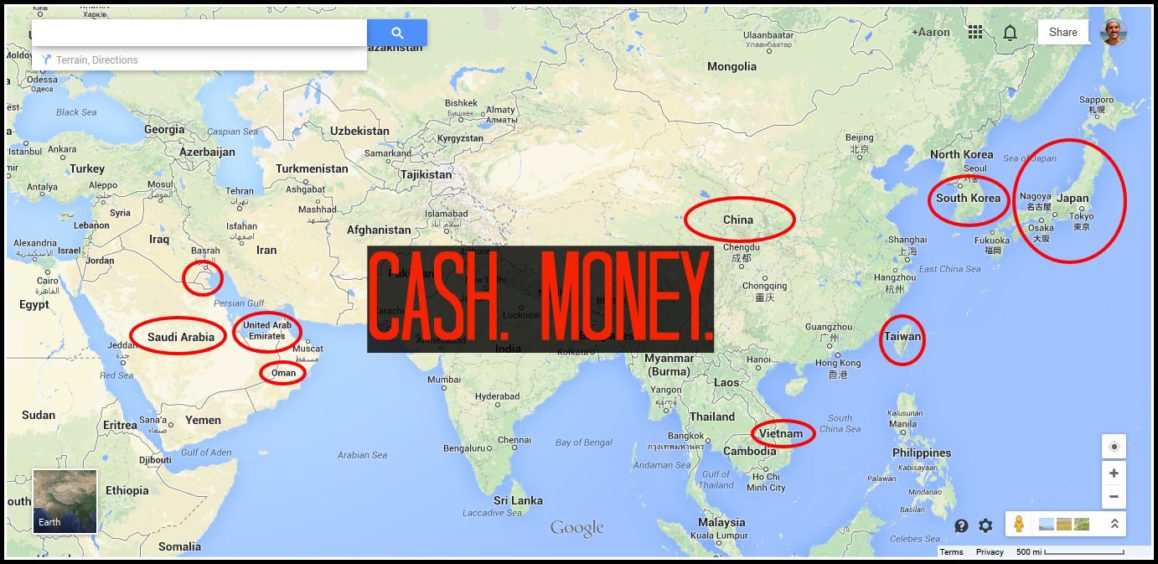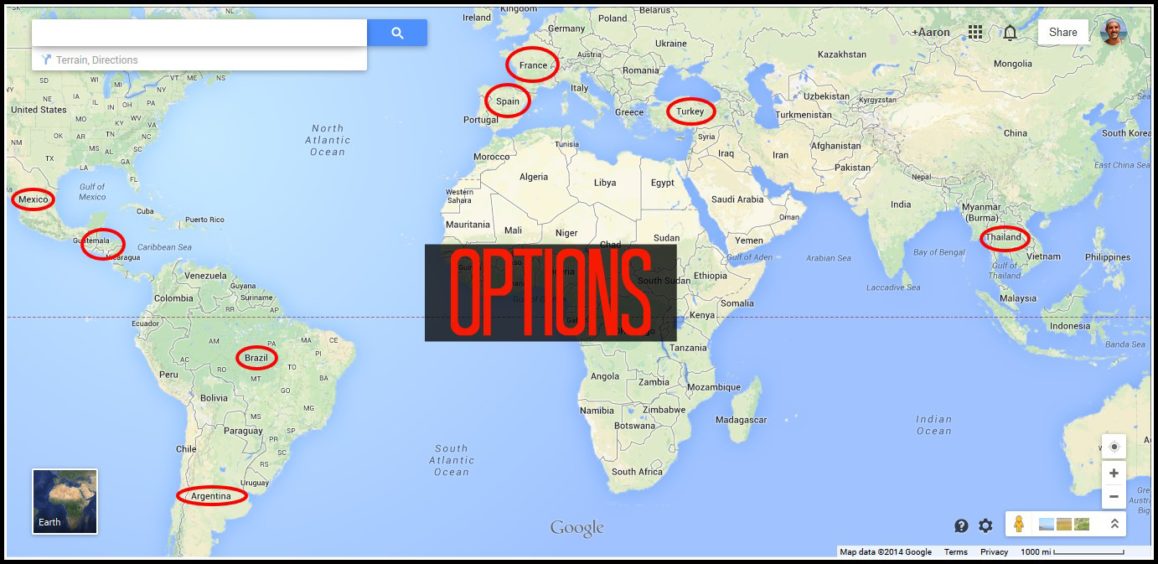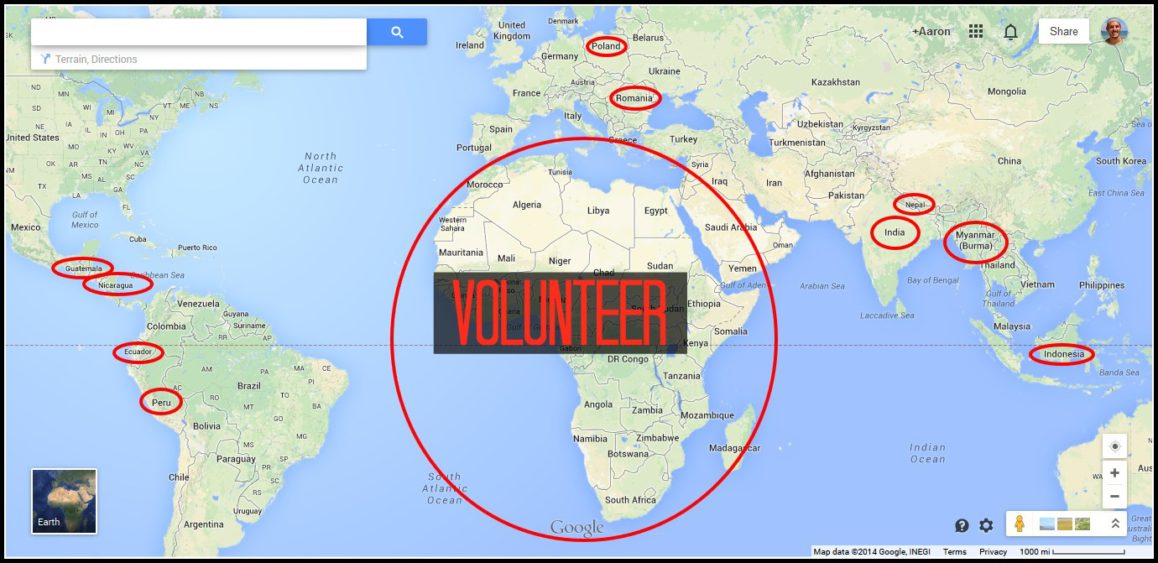The 21 BEST Countries to Teach English [2023]

The Best Countries to Teach English
Looking for the best countries to teach English? This is the ultimate resource for anyone considering looking for a job as an English teacher around the world!
If you want to travel – teaching English can be a dream job. The pay is high, the hours are low, and it enables you to have a once in a lifetime opportunity to truly travel somewhere and see a new part of the world like a local.
I taught English in Hong Kong for a year and can say it was the most valuable experience of my life. I worked 29.5 hours a week and was paid $22,000 HKD ($2,800 USD) a month. I was able to live very comfortably off of $2,000 USD a month, meaning I was living a once in a lifetime experience, and saving almost $1,000 USD a month on top of it!
This is not exclusive to me. Teaching English can be very lucrative, and many countries pay enough to make and save even more money than I did (but we’ll talk more about the money later). Teaching English is one of the most effective, and proven means of finding work while traveling, and in this article, NomadsNation highlights the best countries to teach English..
The market exists, jobs are plenty, and the pay can range anywhere from good-ish to good Lord! The English language is in very high demand, and some countries in Asia and the Middle East will pay good money to learn it. While teaching English can be a way to travel and make some money on the side, it’s typically a full time gig. Teaching English is a full time job, with it’s own list of pros and cons.
But if you want to travel, and think you have the personal qualities that are required to be an effective teacher – then it could quite possibly be your dream job.
Me
I taught English part time in the United States for a few months, and full time in Hong Kong for a year (easily one of the best countries to teach english). I’ve been fascinated with the international TESOL market for years, and have put in a lot of time and research. My knowledge in this industry is superior to most. Heed my words.
Best Countries to Teach English
Before we get into what it takes to be an English teacher abroad, let’s talk about the fun stuff – where you can travel to while teaching. Theoretically speaking, you can find work teaching English anywhere in the world.
But I would certainly recommend some countries over others. Rest assured, finding work as an English tutor in Ulaanbaatar, Mongolia will differ greatly than trying to find work in Beijing, China.
1) Tier one (The Big Boys) – South Korea, Japan, China, Taiwan, Singapore, Vietnam, Dubai, Saudi Arabia, United Arab Emirates, Oman, and Kuwait.
Typically, the markets with the greatest demand for ESL exist in South Asia, China and the Middle East. Greater demand creates higher pay. Higher pay is f-ing awesome.
Why these particular countries? Economic stability. Excluding Vietnam, these countries have a superior economic infrastructure, and because they are more developed nations, they have developed an internationally renowned market for ESL teachers. These countries will, on average, pay teachers much higher than other parts of the world.
Most professional English teachers choose one of (or many) of these countries because of the incredible income potential.
English teachers in these parts of the world consistently boast impressive savings by the end of their teaching contract. If you wish to teach english in South Korea for example and save, you could certainly save $10,000 in a year. How? Good income combined with a low cost of living. These countries seriously invest in their English-speaking futures, and compared to other parts of the world, are cheap to live in.
But wait. There’s more.
Depending on your situation, these Tier One countries may offer incredible perks outside of your salary, included, but not limited to, reimbursement for airfare, free or subsidized lodging, free healthcare, free insurance, and significant bonuses upon completion of contract.
No lie.
Excluding Vietnam, Hong Kong, and maybe Taiwan, each of the aforementioned countries will usually offer these extra benefits, because that’s just what they do.
*A quick side note about Vietnam. It is odd to see them on the list, but in the past years the country has made enormous leaps in it’s ESL market, overtaking Thailand as a more desirable teaching destination.
No, it does not offer the benefits of some of the other countries, but in comparison Vietnam easily has the lowest cost of living, giving you an amazing potential to save. Vietnam’s making moves as one of the best countries to teach English. Keep an eye out. Pho will change your life.*
Yes, it sounds too good to be true. I understand if you don’t completely believe it. Hell, when I tried to tell this information to my parents, their skepticism and general aura of disapproval was unbearable. It was uncomfortable for everyone.
But, these jobs exist, and people with these online TEFL courses are traveling and making money with them every day.
Tier Two (Silver Medal) – Russia, Thailand, Turkey, Spain, France, Czech Republic, Mexico, Costa Rica, Argentina, Brazil
Noticing a trend?
Tier One countries are non-English speaking countries with blossoming economies, that are exclusive to East Asia and the Middle East.
Our list of countries in Tier Two have their own similarities. Not quite the economic powerhouses of Tier One, but they are countries that in more ways than less can be considered anywhere from decent-to-ok, economically speaking.
The Tier Two of ESL Markets still boast many opportunities. They are still some of the best countries to teach English, you may just have to work slightly harder for them, and after your hard work, the jobs might not pay as well, and might not have as low cost of living. They might! But they also might not…
I beg of you, do not let that dissuade you. There are tens of thousands of people teaching English in these parts of the world, you just have to understand that the market is not as developed as the Tier One countries, and inflation might contribute to rising cost of living.
But there are still opportunities. Thailand is consistently a great place to start, and Mexico City is also supposed to have incredible potential.
The pros of Tier Two? Tier Two ESL markets will offer you more international versatility, and enable you to work in different, arguably more attractive, parts of the world.
Tier One is pretty limited to a few countries in Asia and The Middle East. If neither of those regions of the world interest you, then I’m sure some places on Tier Two will tickle your fancy. These countries have a little more zest, as they are countries that are more exotic.
Believe me, if living in Shenzhen doesn’t appeal to you as much as living in Rio or Barcelona, I understand why. That’s when it comes down to a personal decision. What do you want? Do you really, really want to live and teach English in Prague? Then do it!
Don’t negotiate your personal desires for financial stability. If you did that, you wouldn’t be pursuing a life of travel.
Although the teachers in Tier Two countries typically report lower salaries and income, they agree across the board that the pay is at least livable. If you do decide to teach in a Tier Two Country, you’ll want to go into it with decent savings.
These countries are pricey, and you’ll want some $$$ to cover your @$$ for the first few months. Analyze your incentives. If you are looking have the greatest experience you can have, then go with that gut feeling, you shan’t regret it. These are still some of the best countries to teach English.
Tier Three (Good Luck!) – Nepal, India, Vietnam, Indonesia, Poland, Romania (and other parts of Eastern Europe), Nicaragua, Honduras, Ecuador, Peru, The Continent of Africa
This section is the I-really-want-to-be-in-this-country-so-I’m-ok-with-volunteering! section.
If you can find a decent paying job teaching English in these countries I will commend the s**t out of you. Because if you are teaching English in these parts of the world, it’s likely out of the kindness of your heart.
Not that volunteering is a bad thing! I spent an entire summer volunteering on an organic farm in South Portugal. There are a multitude of work-exchange-English-teaching-volunteer-gigs that will compensate you with food and lodging.
Volunteering is incredible and it gives you an amazing experience. The countries above are all very popular volunteering destinations, with enormous opportunities to exchange English lessons for free lodging and maybe even free food.
The work will typically be with children. These Tier Three countries just don’t possess the economic infrastructure to support an ESL market. They have all shown interest in learning English, and there are a lot of ways you can make an impact, just don’t expect to be compensated with money. Incredible backpacking destinations? Yes.
Opportunities to volunteer for accommodation? Yes. Some ideal Location Independent areas? Yes These are still some of the best countries to teach English… You just aren’t gunna get paid.
Qualifications to Teach English
What you need will greatly depend on what sort of work you are looking for, and where you are looking for it. While some of the best countries to teach English in the world have higher requirements… others aren’t as stringent. The four main qualifications are.
1. Fluency in English
2. Education
3. Certification
4. Experience
Fluency in English
Most important and pretty obvious. English does not need to be your first, second, or third language (many English Teachers I’ve met in Hong Kong are Eastern European). But the best countries to teach English will require you to be legitimately fluent in English.
Education
Educational requirements vary from country to country. Some countries require no degree, others require a masters degree.
How education affects your pay
The higher an education you have, the higher demand there will be for you as a teacher.
Higher demand gives you more flexibility, leverage, and ultimately, better pay.
Someone with a Master’s Degree in Education will be a much more desirable candidate, than someone with a basic GED. For example, the education center I worked at in Hong Kong paid teachers with a four year degree or bachelor’s degree $2,000 HK ($257 USD) a month more than me and my two year degree.
Ouch.
How education affects your ability to work legally
You can technically teach English to anyone in the world, but certain countries have educational requirements to obtain a visa and legally work in that country.
To work legally in one of the best countries to teach English, your employer will sponsor an application for you to obtain a legal work visa. Different countries have different work visa requirements.
For example, in Japan, English Teachers must have a four year degree, or else they will not be approved for a work visa.
Experienced? Doesn’t matter.
Best English Teacher in the history of mankind? Doesn’t matter.
You need a four year degree. No if’s and’s or but’s.
If you are a foreigner wanting to live and teach english in Japan, the government requires a four year University degree. It is illegal for any language center or school to hire an English teacher in the Japan without one. Case closed.
It’s the rules, but the good new is these rules vary from country to country. The best countries to teach English will require some sort of degree. Some require a four year degree, some two!
Type of degree
Does the type of degree matter? It can certainly help, but it most likely won’t hurt.
Obviously a degree in English, Literature, Teaching, or something else related to the ESL field could benefit you, but otherwise don’t worry, a degree is a degree is a degree.
It doesn’t matter if it’s a degree in communications or puppetry. You can teach English anywhere in the world, you just might need certification as well (more on that in a minute).
Masters Degree
If you have a Masters and are serious about Teaching English and are serious about making some serious money – look East. The middle of it.
In terms of money to be made, the Middle East has some of the best countries to teach English with some of the highest paying ESL market in the world.
Countries like U.A.E, Kuwait, and Oman are okay with a four year degrees, but greatly prefer a Masters Degree. These are very wealthy countries that demand the best of their teachers and can pay for it.
You will be a professional English Teacher, in a professional environment, and you will be compensated very well for it. But again, if you have a Masters Degree you can work in any of the best countries to teach English.
Four Year Degree
Excluding those few wealthy countries in the Middle East, if you have a four year degree, you are absolutely 100% golden to teach English across the world.
Those few countries aside, you will never need more than a Bachelor’s degree. Most of the best countries to teach English are in Asia. China, Japan, Singapore, South Korea, Taiwan, Thailand and Vietnam are some of the best countries to teach English, and most of them require a four year degree to legally obtain a work visa.
There are many a people who have gotten jobs and contracts under the table (particularly in Thailand and Vietnam), but it comes with great risk.
You will be working illegally, and can easily be taken advantage of. The web is plagued with horror stories of English teachers accepting illegal jobs in Thailand and never getting paid.
It makes sense. What are you gunna do if they don’t pay you? File a complaint?
This is why finding illegal work is doable, but not recommended. So if you do have a four year degree, know that you are good to teach English abroad in 99% of the countries in the world.
Don’t have a four year degree? Neither do I. Read on.
Two Year University Degree
That’s me! Yes, I have skillfully obtained a two year Associates Degree from Florida Gulf Coast University.
If you are like me, there are still a lot of options. I taught in Hong Kong, but I would not recommend this market for someone with a two year degree.
While an Associates Degree was sufficient a few years ago, it seems Hong Kong as a whole is tightening their English-teacher-work-visa-requirements. It took me longer than expected to find a job, and centers willing to hire someone without a four year degree are lessening by the day.
If you want to get paid well, and live comfortably, I’d say your best bets are China or Taiwan. If you have some money in the bank and are OK with not getting paid as well, maybe Spain, Chile, Argentina or Brazil.
*Personal Recommendation – If you have a two year degree, but are looking for work in a country that prefers a four year degree, just avoid the specifics. I was able to find work at an English Center that required a four year degree University Degree.
During the interview I nodded and emphasized the fact that I have a University Degree (I do). They hired me and realized after the fact that my University Degree was a two year degree. While they were surprised, they didn’t mind, we just had to wait to see if the government approved the visa, which they did! I can’t guarantee it’ll work for you but it worked for me.*
No Degree
No degree at all? It’ll be tough, but not impossible. You have a few options.
- Work illegally. Not recommended, but an option. Just be prepared to possibly be taken advantage of and risk not being paid.
- Volunteer. Easy. You’ll find plenty of gigs. Just none that pay.
- Get creative.
You still have the ability to generate income if you want to teach English around the world. You just have to think outside the box. Wandering Earl has a great piece on his experience teaching English privately in Thailand.
While backpacking through Thailand, he rented an apartment in Chiang Mai, went to the local universities, and set up fliers advertising affordable English Lessons. He claims it worked incredibly well, generating more than enough income to live comfortably in Thailand.
If you are interested in Teaching English to travel around the world, then read it right now. He really shows you how a little creativity can help you to teach English anywhere in the world, regardless of your professional qualifications. http://www.wanderingearl.com/how-to-fund-your-travels-with-creativity/
Aside from that, if you are thinking about ESL as a career in one of the best countries to teach English, then make the investment. Get your degree.
My take
While I personally believe that teaching English is one of the greatest ways to travel, I only do in part because of its convenience.
For example, if I had to go to a special program for three years to get a special certificate to teach English, I’d say f**k that. If I had no university degree, I wouldn’t go back to school just to have the option.
It is a very, very nice option to have, but I don’t think it’s imperative. So, if you reallllyyy want to work as an ESL teacher in one of the best countries to teach English – yes, your degree is a solid and wise investment.
If teaching English sounds like a desirable longer-term career, then invest in a degree. This industry won’t be going anywhere anytime soon, and you can make great money while traveling.
But if you have no degree, don’t feel pushed to obtain one just to work in one of the best countries to teach English. There are a s**t ton of other ways to make money while traveling.
Certification
It’s is a big one, and anyone considering teaching English should at least look into certification. It’s for your personal benefit as it gives you more legitimacy and most employers will require it if you want to be sponsored for a work visa.
There are different types of certification programs, but the differences aren’t as important as you might think. TESOL (Teach English as a Second Language), TEFL (Teach English as a Foreign Language), CELTA (Certificate in English Language Teaching Adults) – there’s a bunch to choose from.
There are hundreds of companies offering certification classes, both in digital and traditional classroom settings.
My recommendation is this. Go cheap. Yes, you can get your certification in an actual classroom setting, with an actual teacher, over a set amount of time… it’s just pricey.
Some of these courses are well into the thousands of dollars. Are they worth it? I believe they can be. If you are someone who has a difficult time teaching yourself, or just really prefer a classroom setting, then go for it.
I have friends who did actual classes, and some firmly believe that it better prepared them for ESL work. Alternatively, online options exist at a fraction of the cost. Some of the more reputable companies will charge somewhere in the less-than-a-thousand range. When I was considering obtaining my certification, I found a Groupon offer (below) for only $69.
Why do I recommend going cheap? Because ESL potential employers don’t necessarily care who your certification is through. Actually, most of the time they don’t give a s**t. They just want or need you to be certified.
You are paying for the education, but even more so, you are paying for certification.
These school’s only care about one thing, that you are in fact certified. Nomads Nation contributor Bernie Green and myself both legally taught English in Hong Kong, and both of us took the exact $69 Groupon certification above.
The type of certification rarely matters. Every now and then you’ll find a job posting that requires an in-class certification. But not enough to even think about justifying doing it.
Everyone I have met teaching English has confirmed the same thing to me. Just get certified, it doesn’t matter how you do it.
Like I said, If you are uncomfortable learning online, or if you are considering pursuing ESL as a lifetime career, and really have a passion for teaching English, a traditional classroom setting could certainly benefit you.
Consider it an investment for your future profession. But for the average traveler considering alternate means of income, do it online. As long as you feel confident in your ability to teach yourself, I strongly suggest foregoing more expensive routes, bust out the laptop, and DIY. Here are some suggested sites to get you on the right path… http://www.internationalteflacademy.com/ http://www.oxfordseminars.com/
Experience
As with everything in life, experience helps, and can compensate for other lack of qualifications. For example, if you have no formal education teaching English, but are certified and taught English privately for years, you could be considered a more desirable hiring candidate than someone with some education and no experience.
The solution? Create experience.
Before moving to Hong Kong, I volunteered at a local Language Center in my hometown for three months.
For the first month, I sat and took notes in the back of classes, learning what I could. And for the second and third month, I was a part-time (volunteer) teacher.
This experience was freaking crucial. Because of this I was a) more confident in teaching abilities and b) experienced! My resume looked a thousand times better now that I could put part time English Teacher on it. It made the world of a difference.
Don’t have a local language center? Offer free lessons online via Skype. Post an ad. Teach a friend. Teach a friend’s friend. Be resourceful. Get creative. Experience will help take your resume to another level.
Options
There are a lot of different ways to teach English around the world, and a lot of different ways to create income. Most people opt to work at language schools.
A bizarre concept to someone from the US, language schools are ubiquitous in other parts of the world. Adult language schools, youth language schools, the ages vary, but the concept remains the same.
Language schools are the preferred method of employment due to their popularity, consistency and lucrative contracts and professional environment.
Feeling a bit entrepreneurial? Private lessons. A lot of teachers will work at their respective school, and through time and networking, will become a private tutor. As a private tutor you can charge higher rates, and eventually work less hours. Many teachers will start teaching through language schools, then after a few years go completely private, as they collect enough clients to sustain solely off of. Word of mouth is huge.
Some things to consider…
So let’s say you’re qualified and ready to start teaching! How the hell you choose only one of the best countries to teach English?
For me I say consider your wants and needs. Where do you want to travel to? Do they have an ESL market? Do you have the qualifications to teach? If not, can you obtain them? And just as important – identifying what is most important to you! Which do you choose?
Culture and location? Or making a f**k ton of cash? (Hint, you can still have both!) First timer? Want direct advice?
I suggest going to Asia.
China, Hong Kong, Vietnam, Taiwan, Japan and South Korea have incredible ESL markets, pay very well. They are exotic, low cost destinations, that will enable you to have an incredible experience while also living very comfortably and saving money with little effort.
In my personal opinion, these are the best countries to teach English.
If you have a four year degree or better, check out Hong Kong, Japan or South Korea for the best pay.
Two year degree? Taiwan or China.
No degree? Possibly Vietnam and maybe Thailand, with the understanding that you might need to get a little… creative.
The Middle East is still very appealing, but strict laws and conservative religious views might damper your ability to have the same amount of fun. It’s too easy to have fun in Asia.
Then, if you want to move on to a Tier Two country, you have the experience and maybe the connections to negotiate a higher salary. I’m absolutely not knocking the Middle East, it boasts incredible opportunities, I just think that Asia has a cultural, and social edge.
Most people start in Asia for these reasons. Asia’s where you teach to have fun. Middle East is where you go to get paid.
If you are looking to teach English around the world, it might be for some quick travel money or a life-long career. Either way, I commend it. I embrace it. I encourage it. ESL is an amazing way to travel, and really experience a culture by fully consuming yourself in it.
There are so many opportunities to make money and see a unique part of the world. Thousands of people are teaching English, and I can only hope that thousands more will join. (Also, if you want more information on which countries pay and offer the most to their English Teachers, check out this chart from International TEFL Academy.
Keep in mind, the number are approximate, but it’s still cool.) Further recommended reading http://nomadicsamuel.com/category/teaching-english http://www.businessinsider.com/how-to-get-a-job-teaching-english-abroad-2013-10







So astonishingly full of shit. You just guessed about the countries you’re not interested in huh.
Hey Tony! Actually, as with every article on NomadsNation, a ton of research went into this article, and it is 100% accurate. If you have any specific examples of this ‘shit’ you speak of, please let me know 🙂
Thanks for the useful information! I’m moving to Hong Kong for a full-time job but I want to work part time at a center. Wanted to get your advice if you think this would be possible? (I have previous exp and a degree).
That will depend on a few factors (visa situation, qualifications, etc.). I’d def. look into tutoring privately. If you have the credentials you’ll be able to make your own hours and charge more $$$
Howdy!!
The language understanding online site, preply.com , happens to be roughly to be a social networking websites because 2012
See you!
Very informative post! Thanks for all the information. Learned a lot !!
Love Nomadsnation!!
Thanks Dina!